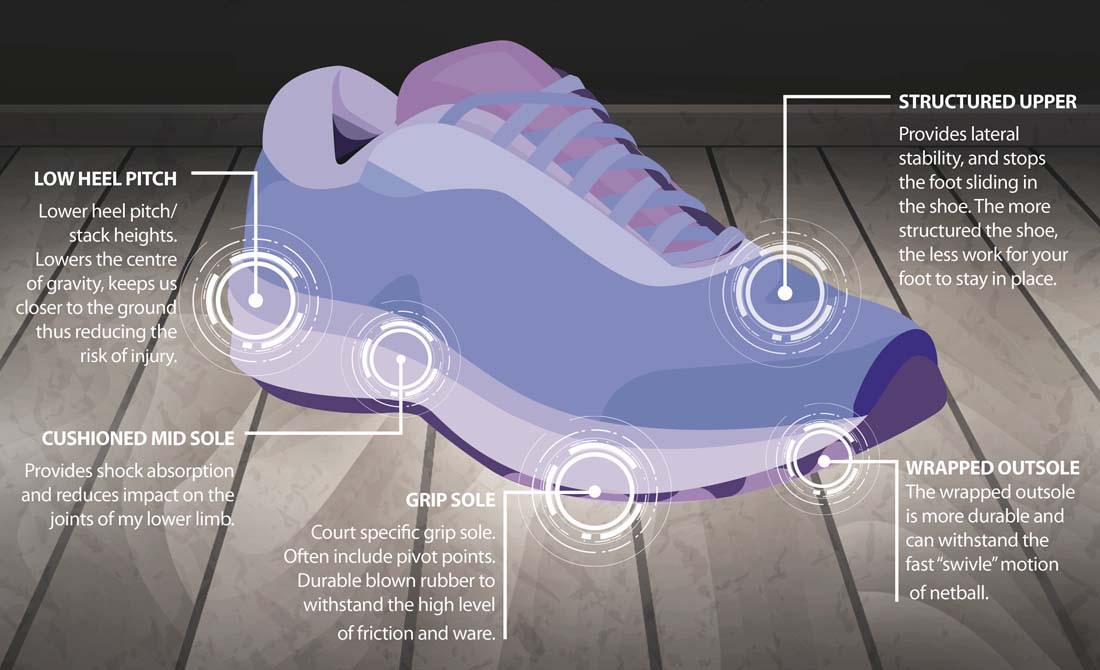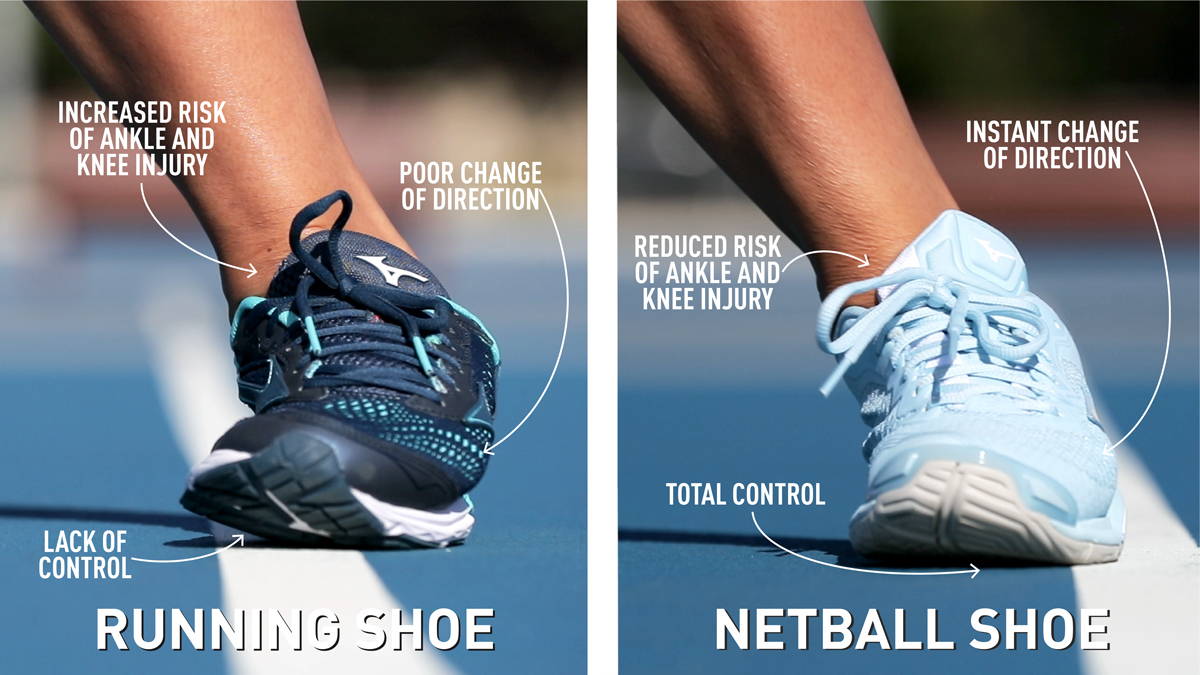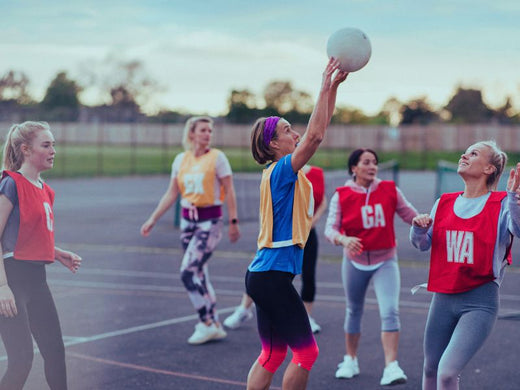A netball shoe is a ‘court specific’ shoe that is designed to withstand side-to-side and stop start movements required in court sports (such as tennis and basketball). As opposed to a running shoe, which is designed for straight-line high impact, repetitious activities such as walking and running. When playing Netball, it is important to ensure you are wearing activity specific shoes to improve performance, minimise fatigue and the risk of injury. Therefor increasing level of performance, enjoyment and success.

Structured Upper: Provides lateral stability, and stops to the foot sliding in the shoe. The more structured the shoe, the less work for your foot to stay in place.
Wrapped Outsole: The wrapped outsole is more durable and can withstand the fast “swivel” motion of netball.
Grip Sole: Court specific grip sole. Often include pivot points. Durable blown rubber to withstand the high level of friction and ware.
Cushioned Mid Sole: Provides shock absorption and reduces impact on the joints of my lower limb.
Low Heel Pitch: Lower heel pitch/ stack heights. Lowers the centre of gravity, keeps us closer to the ground thus reducing the risk of injury. Typical running shoes have a higher heel pitch/ stack height due to the high-density cushioning required for a high impact activity, such as running. In contrast, the sudden stops and turns of netball requires that the foot be planted securely to the court to avoid the ankle rolling of straining. The lower the centre of gravity, the sturdier the foot.

Running shoes Versus Netball Shoes: Pros and Cons
Every shoe is design with a specific functionality. And it is being proved that netball-specific shoes are superior to running shoes in injury prevention and optimum performance. Reason why is recommended for players not to wear running shoes for this sport. However, it is important to highlight the pros and cons of both netball shoes and running shoes for training and performance.
Netball is a high-impact sport that requires rapid acceleration and deceleration, sudden and sharp changes in direction, immediate stops, high-impact jumps and ongoing balances and stabilities. The players are at high risk of injury, particularly to the knees, ankles and lower bodies.

Netball-specific shoes
Pros:
Netball shoes have been designed specifically to minimize the impact of stress upon the feet, knees and joints.
The midsole of a netball shoe sits lower to the ground than the midsole of a running shoes. This creates a more stable, cushioned platform for your feet to sit upon. Sitting lower to the ground increases your comfort and the added cushioning allows for greater movement and higher flexibilities. Most importantly, the lower midsole on a netball shoes give you greater stability. For those who have had ankle injuries, a stable platform is imperative to prevent re-injury.
Netball shoes are also a lot stiffer through the front of the foot than running shoes. This assists in injury prevention, and also allows for greater pivoting and dodging actions. The outer sole of a netball shoe has a greater grip and longer-lasting rubber than a typical running shoe. It is also made of a non-marking rubber which is important when playing on indoor netball courts.
Cons:
Netball shoes can be considered to be heavy and cumbersome. It may seem that these shoes prioritise injury prevention over peak performance which can be frustrating if you are looking for a pair of shoes that are light-weight and improve in speeds.
Running shoes
Pros:
Running shoes can provide an array of benefits for your whole body: running shoes race faster. They are designed for speed. They also make you feel faster; running shoes are lightweight and softer than netball shoes, which means that you will feel as though you can mobilize more quickly throughout the court.
Cons:
Running shoes are designed for forwards and backwards movement, not for lateral movement. Therefore, prioritizing speed on the court and wearing running shoes instead of netball-specific shoes can increase your risk of injury when carrying out lateral movements.
Running shoes also lack the durability required for netball, and so you will need to replace them frequently. Furthermore, running shoes often do not have much cushioning which leaves your foot less protected. Your ankle often sits higher, and is less protected and at risk of injury.
Running shoes are suitable for conditioning activities such as the gym, or short distance runs, so can be worn during these activities. However, it is recommended that netball-specific shoes, or cross-trainers as a second-best option, are worn for netball training and games.

Conclusion
Choosing the right footwear is crucial for netball players to enhance performance, reduce fatigue, and prevent injuries. While running shoes are designed for speed and forward motion, they lack the lateral support, durability, and stability required for netball’s high-impact, multi-directional movements. Netball-specific shoes provide superior grip, cushioning, and a lower heel pitch to keep players stable and protected on the court. For optimal safety and performance, netball shoes are the best choice for training and games, while running shoes can be reserved for off-court conditioning activities.




How to choose a Workout Shoe
Physio's Guide to Football Boots